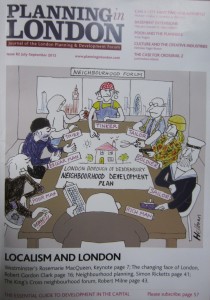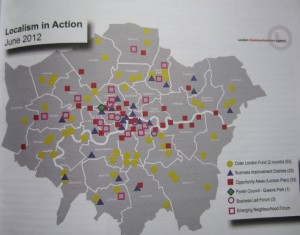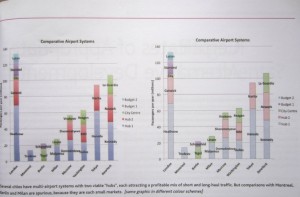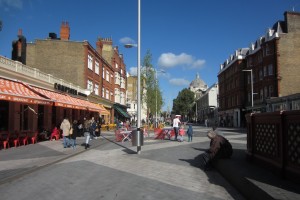OC 51: Localism Explained
Bottom up aspirations
Demand for local control over local affairs is not new, so the recent Localism Act (2011) should be welcome by those who care for their neighbourhoods. Land and its use is one of the key areas which matters to local people who live, work and play there. It may surprise that a centralised country like the UK should respond to such sentiments in law. Note, the Localism Act applies to England only, as planning decisions have been devolved to Scotland and Wales.
Localism Act in practice
So how local is the concern of the Localism Act? It has been followed rapidly by the National Planning Policy Framework (NPPF 2012), a law that applies also to England only, a top down companion in the ultra vires tradition to what should encourage local initiatives in matters of spatial development. A closer look provided by professionals whose job it is to interpret and/or implement this legislation shows that neither of these statutory instruments are unambiguous and a lot may have to be clarified in case law.
Planning in London, the Journal of the London Planning and Development Forum has dedicated a comprehensive issue (82, July-September 2012) to these questions. It includes views presented at the London Planning and Development Forum summed up by Drummond Robson and experienced planners like Rosemarie MacQueen, strategic director, built environment at Westminster City Council who illustrates how a local authority is adapting to this legislation.
Cohabitation of Localism and National Planning Policy Framework
Three other contributions provide informative insights on how the Localism Act may work in practice. Simon Ricketts (co-author of localism and planning, 2012, Bloomsbury Professional) comments on neighbourhood planning; Robert Milne on neighbourhood forums, and Robert Gordon Clark (chairman, Communications Agency) on how localism may change London. All of them make the point about unchartered territory, as do the various lobbies in their views on the practical workings of the Localism Act and the NPPF. From a London perspective, the latter seems to be wanting in urban environments (MacQueen) whilst neighbourhood plans may become an unnecessarily complex fourth tier of policy in London (Ricketts). Ultimately, after the incentive of £20,000 to get the process started has run out, a realistic hurdle will be expertise, time and money for local people to engage in sustained and enhanced neighbourhood planning (Milne).
Lobbies
Much space is offered to the points of view of lobbies which tend to deal with macro-economic planning issues. London First, a business pressure group makes the case for Crossrail 2, a new addition of public transport to link south-west to north-west London and pushes for a third runway at Heathrow airport yet again, as opposed to two hub airport cities described by Michael Schabas (connected to Canary Wharf Developments, the second financial city in East London) with two locations for air transport in large cities.
London’s long term future
More long term visions for London with the aim to preserve its world city status (Greg Clark) include the need for a strong creative sector (Nicholas Page-Brown), and identify vast development areas in the “Evolving London” report of the Centre for Cities (co-author Tom Bolton). The latter is building on the ‘Londonism’ laid down in the current Mayor of London plan which should keep foreign investment flowing into London brick and mortar (Nigel Moor), especially if Roger Zogolovitch’s advice is followed to monetise the planning system, and relaxed planning and stamp duty changes bring about densification through extensions and basements (Malcom Dowden and Helen Hutton).
Sustainable development?
So much for localism and sustainable development, quoted in most articles, including its social dimension. Not surprisingly, the latter is quietly omitted, except by Duncan Bowie (University of Westminster) who expresses his concerns about a future London lacking much needed affordable, let alone social housing. Confounding affordable rent and social rent in the revised early minor alterations of the London Plan means that individual London boroughs can no longer maintain social housing targets in their core strategies above the mayoral housing policy. Adding to that the austerity measures affecting civic services will affect quality of life not only of the bottom squashed but also of the squeezed middle. Does London want to become a gated city for the rich and super-rich, or does it want to remain a cosmopolitan mixed society where people from all walks of life cohabitate and benefit from each other?
sustainable neighbourhoods:









